Balinese kitchen culture is a captivating blend of culinary artistry and profound spirituality. Participants enjoy hands-on experiences, learning to craft traditional dishes while embracing the sacred essence of each ingredient. Beyond mere cooking, this practice encompasses rituals of purification and gratitude, reflecting the deep cultural significance woven into Balinese cuisine. With ceremonies, holy water, and the crafting of canang saiban offerings, the experience offers a unique window into the intricate tapestry of Balinese culinary traditions. Explore this captivating journey and uncover the layers of meaning that elevate everyday meals into acts of reverence.
Key Points
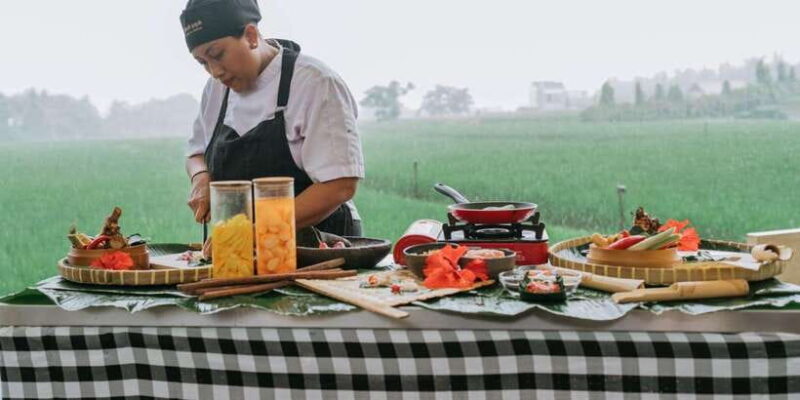
- Balinese kitchen rituals involve purification ceremonies, proper attire, and ritualistic plating to honor the spiritual significance of food preparation.
- Cooking in Bali is imbued with gratitude and devotion, reflecting the deep spiritual connection between food and daily life.
- Canang saiban, or post-cooking offerings, are an integral part of Balinese culinary practices, showcasing the sacred nature of nourishment.
- Balinese chefs with extensive expertise guide participants through the cultural and spiritual aspects of traditional cooking techniques.
- The Balinese kitchen experience combines culinary learning with immersive exploration of the intertwining of spirituality and everyday food preparation.
Overview of the Experience
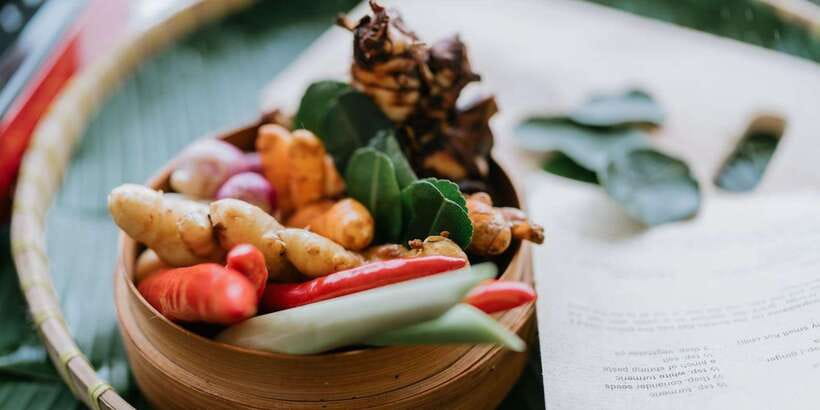
The Balinese Kitchen Culture experience offers a unique opportunity to take in the culinary traditions of the island.
Priced at €35.66 per person, this two-hour private group experience takes place at Tanah Gajah, a Resort by Hadiprana, with instruction in both Indonesian and English.
Guests can look forward to learning to cook traditional Balinese dishes, understanding kitchen rituals, and exploring the spiritual significance of food preparation in Balinese culture.
With stunning views of rice paddy fields, hands-on learning from experienced Balinese chefs, and a focus on both culinary and cultural aspects, this experience promises a deep dive into the heart of Balinese gastronomy.
You can also read our reviews of more tours and experiences in Indonesia.
Culinary Learning Activities
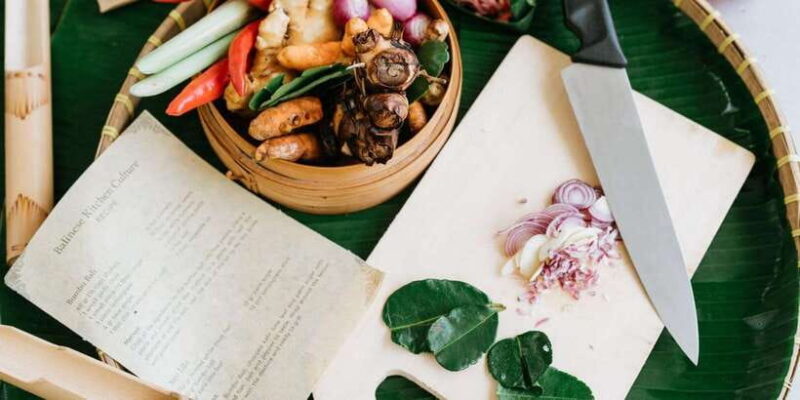
Participants in the Balinese Kitchen Culture experience learn to cook several traditional Balinese dishes. These include Sate Lilit, a delectable fish satay, and the spicy condiment Sambal Matah. They also make Dadar Gulung, a coconut pancake.
Alongside the cooking, they’ll understand Balinese kitchen rituals. This includes purification ceremonies with holy water and the proper way to dress and plate the dishes.
They’ll also learn about the preparation of canang saiban, an offering made after cooking. This hands-on culinary journey provides insights into how spirituality is deeply interwoven with daily life and food preparation in Bali.
Balinese Kitchen Rituals
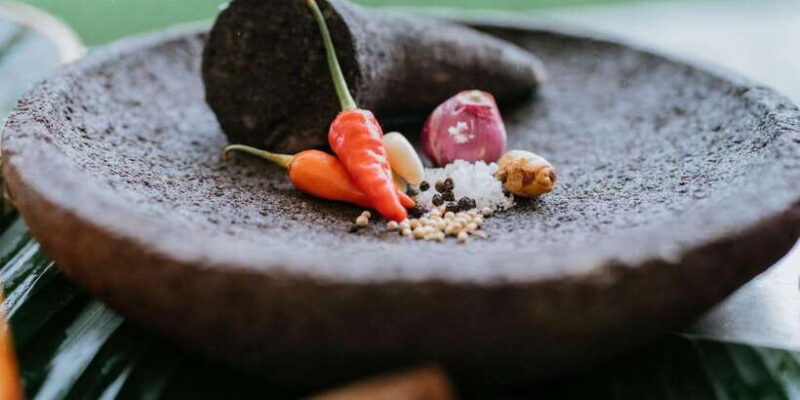
As participants enjoy the Balinese Kitchen Culture experience, they’ll witness the profound significance of rituals that are deeply ingrained in the island’s culinary traditions.
They’ll learn about the purification rituals, including a blessing with holy water, which are performed to cleanse the cooking area and prepare the ingredients.
Participants will also observe the proper clothing and plating practices that honor the spiritual aspects of food preparation.
The experience culminates with the creation of a canang saiban, an offering made after cooking, demonstrating the intertwining of spirituality and daily life in Balinese culture.
Spirituality in Balinese Cuisine
At the heart of Balinese cuisine lies a profound spiritual connection that permeates every aspect of food preparation.
The rituals and practices associated with Balinese cooking are deeply rooted in the island’s rich cultural and religious traditions. From the purification ceremonies to the careful plating of offerings, each step reflects a reverence for the divine and a belief in the sacred nature of nourishment.
This spiritual dimension isn’t merely a backdrop, but an integral part of the Balinese culinary experience, shaping the way dishes are conceived, prepared, and shared.
It’s a testament to the enduring power of faith to infuse the everyday with meaning and significance.
More Great Thing To Do NearbyVenue and Highlights
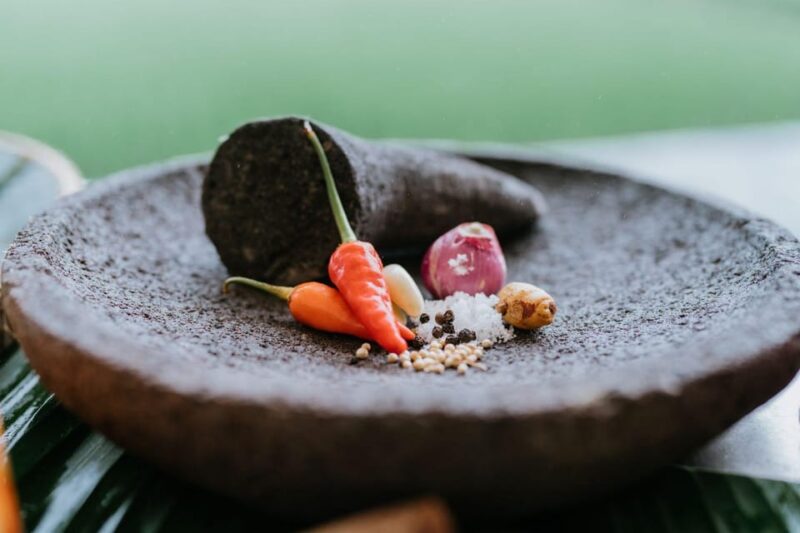
Where does the Balinese Kitchen Culture experience take place?
The experience is hosted at Tanah Gajah, a stunning resort nestled amidst picturesque rice paddy fields. This photogenic venue provides the perfect backdrop for guests to enjoy Balinese culinary traditions.
The hands-on cooking class is led by experienced Balinese chefs, who share a decade of expertise in the local cuisine.
Beyond the culinary aspects, the experience also delves into the spiritual significance of food preparation in Balinese culture.
With a focus on both the culinary and cultural elements, the Balinese Kitchen Culture experience offers a truly unique and enriching encounter for participants.
Important Information for Participants
The Balinese Kitchen Culture experience includes several important details for participants to be aware of.
The package includes free flow water and transportation, either pick-up or drop-off. However, it’s not suitable for children under 10 or people over 70 years old.
Participants are encouraged to bring a camera to capture the photogenic venue and its stunning views of rice paddy fields.
Alcohol and drugs are strictly prohibited, and intoxicated participants may be refused service without refunds. Outside food and drinks are also not allowed.
Pricing and Booking Details
The Balinese Kitchen Culture experience costs €35.66 per person.
This 2-hour program takes place at Tanah Gajah, a Resort by Hadiprana, and is available in both Indonesian and English. Participants can opt for a private group experience.
Cancellations up to 24 hours in advance qualify for a full refund. Travelers can also choose to reserve now and pay later.
The experience isn’t suitable for children under 10 or people over 70. Participants should bring a camera, as the venue boasts stunning rice paddy views.
Alcohol, drugs, and outside food and drinks are prohibited, and intoxicated guests may be denied service without refunds.
Cultural Insights and Significance
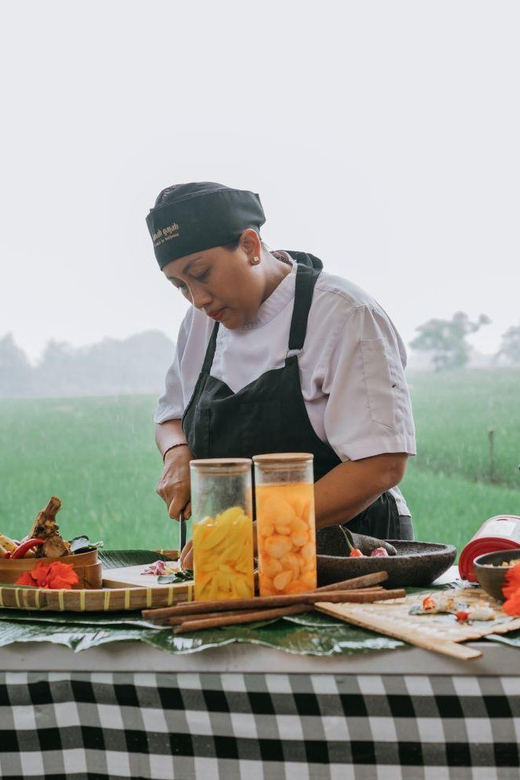
One of the experience’s key highlights is its emphasis on the deep connection between food preparation and spirituality in Balinese culture. Participants will gain insights into how cooking is imbued with gratitude and devotion, with rituals like purification blessings and offering preparation woven into the process. As Deasy Swandarini, the general manager of Tanah Gajah, explains, the intertwining of spirituality and daily life is a fundamental aspect of Balinese culture that is reflected in the culinary traditions.
| Spiritual Significance | Culinary Rituals | Cultural Insights |
|---|---|---|
| Gratitude and devotion | Purification rituals | Connection between food and spirituality |
| Intertwining of spirituality and daily life | Offering preparation | Emphasis on gratitude and devotion |
| Fundamental aspect of Balinese culture | Blessing with holy water | Insights from Balinese experts |
Frequently Asked Questions
Can I Modify the Menu Items to Suit Dietary Restrictions?
Yes, the menu can likely be modified to accommodate dietary restrictions. Participants should contact the organizers in advance to discuss any specific needs, as the chefs may be able to adapt the dishes accordingly.
Is There a Dress Code for the Balinese Kitchen Experience?
There’s no strict dress code, but participants should wear comfortable, modest clothing that covers the shoulders and knees. Closed-toe shoes are recommended for safety during the hands-on cooking activities.
Are There Any Discounts Available for Group Bookings?
Yes, there are discounts available for group bookings of the Balinese Kitchen Culture experience. Groups of 4 or more can receive a 10% discount per person on the standard price.
Can I Purchase Additional Souvenirs or Local Products After the Class?
Participants can purchase additional souvenirs or local products after the class. The venue offers an assortment of Balinese crafts, spices, and other speciality items for guests to browse and purchase as keepsakes from their culinary experience.
Is There a Minimum or Maximum Number of Participants Required?
The experience has no minimum or maximum number of participants, allowing for both private and group experiences. Participants can book as individuals or as part of a private group.
Recap
Balinese kitchen culture offers a profound culinary experience, blending traditional dishes, sacred rituals, and deep-rooted spiritual beliefs. Participants learn to create authentic Balinese cuisine while engaging in purification ceremonies and crafting sacred offerings, seeing the cultural significance and reverence woven into the island’s vibrant gastronomic traditions. This unique experience provides a glimpse into the heart of Balinese culinary heritage and the profound connections between food, spirituality, and community.
You can check if your dates are available here:More Tour Reviews in Indonesia
Not for you? Here's more things to do in Indonesia we have recnetly reviewed
- 3 Best Dining Experiences In Indonesia
- 20 Best 2 Day Tours In Indonesia
- 3 Best Dinner Tours In Indonesia
- 20 Best 3 Day Tours In Indonesia
- 3 Best Shopping Tours In Indonesia
- 11 Best Cruises And Boat Tours In Indonesia
- 12 Best Full-Day Tours In Indonesia
- 5 Best 4 Day Tours In Indonesia
- 3 Best Coffee Tours And Tastings In Indonesia
- 8 Best Massage And Relaxation Services In Indonesia
- 18 Best Photography Experiences In Indonesia
- 12 Best Lunch Experiences In Indonesia
